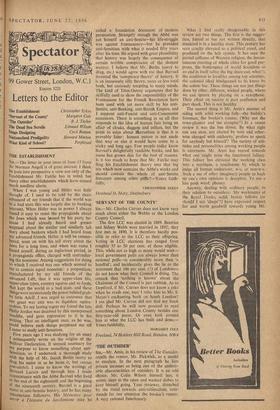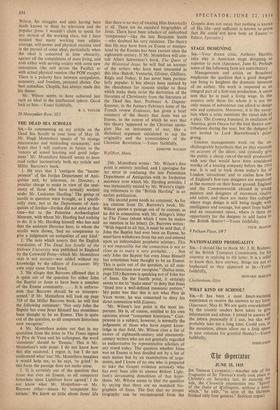'THE OUTSIDER'
SIR,—Mr. Amis, in his review of The Outsider, recalls the render, Mr. Pickwick, as a model to emulate. In the next paragraph he lists private incomes as being one of the undesir- able characteristics of outsiders. It is an odd choice. Mr. Colin Wilson himself has, it seems, slept in the open and washed dishes to keep himself going. Your reviewer, disturbed by the trend towards anti-rationalism, corn mends for our attention the bookie's runner. A very rational functionary. What 1 find really disagreeable in this review are two things. The first is ,the sugges- tion, hinted at but not written direCtly, that mankind is in a healthy state. This pentury has seen cruelty elevated to a political creed, and produced on the belt system. It has seen the partial collapse of Western religion, the instan- taneous roasting of whole cities for good pur- poses, the bankruptcy of world Socialism as au end in itself (after the big share-out, what?). the confitsion in loyalties among top scientists. the colonial ideal bludgeoned to its knees by the colour bar. These things are not just things done by other, different, wicked people, whom we can ignore by playing on a saxophone. Their effect on society is part confusion and part shock. This is not healthy.
The second thing is Mr. Amis's manner of siding with solid working folk—the builder's foreman, the bookie's runner. (Why not the town-planner and the croupier?) In a recent review it was the bus driver. By what right can any man, not elected by vote and other- wise charged with authority, profess to speak for anybody but himself? The variety of atti- tudes and personalities among working people is enormous. Mr. Amis has veered towards what one might term the, functional fallacy. This fallacy has elevated the working class into a mystique, a touchstone by which to judge all human endeavour, or non-w-c. Such a use of other imaginary people to back up one's own opinions is deceptive. To use a less posh word, phoney.
Anyway, dealing with ordinary people, in their relation to outsiders: My workmates at the Royal Docks, solid, breezy fellows (or should I say `chaps"?) have expressed respect for and warm goodwill towards young Mr. Wilson, his struggles and aims having been made known to them by television and the popular press. I wouldn't claim to speak for any section of the working class, but I have noticed that many working men admire courage, will-power and physical stamina used in the pursuit of some ideal; particularly when the ideal is conceived in lone obscurity, against all the compulsions of mass living, and ends either with serving society with some new conception (the raft across the Pacific), or with actual physical reunion (the POW escape). There is a polarity here between compulsion, nonentity, and freedom,, personal choice. Our best comedian, Chaplin, has always made this his theme.
Mr. Wilson seems to have achieved just such an ideal in the intellectual sphere. Good luck to him.—Yours faithfully, B. J. TAYLOR 20 Montpelier Row, SE3



































 Previous page
Previous page